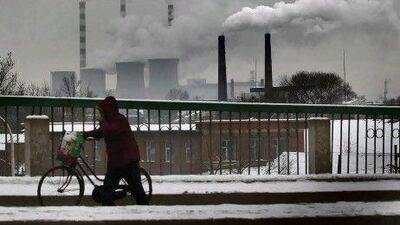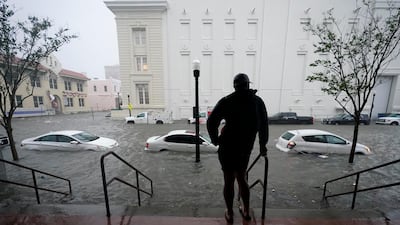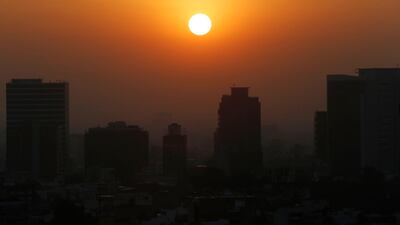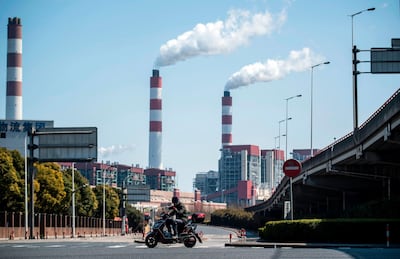One of the few bright spots in 2020 was the glimpse that Covid-19 lockdowns gave of a less polluted world.
But like the pandemic that sparked them, the big question for 2021 is how the world should react to what happened.
An unexpected experiment
The first few months of 2020 saw a deadly virus spread across the world, trigger a pandemic – and start an unplanned global experiment.
As governments raced to stem the spread of Covid-19 by putting their people in lockdown, the Earth’s climate began travelling back in time. With travel banned, non-essential businesses closed and energy demand plunging, emissions of carbon dioxide nosedived. By the start of April, they were back to where they were in 2006.
Climate scientists began pondering the impact of a sudden 17 per cent drop in emissions, which had until then been growing at 1 per cent a year. By the first half of the year, global emissions had fallen by more than they did at the end of the Second World War.
Yet barely had the global experiment revealed itself than it began to end. By early summer, lockdowns were being lifted, and global carbon dioxide emissions began heading back up.
As with the impact of the pandemic itself, however, the global figure hid startling national differences.
The draconian lockdown imposed in China allowed business as usual to be restored in weeks.
In contrast, the struggle of other countries – notably the US, the UK and France – to contain the virus led to deeper and longer-lasting dips in carbon emissions.
Ironically, this also reflected their relative success in cutting overall carbon emissions. Having moved away from the dirtiest forms of fossil fuels to generate energy, a higher proportion of comes from sources such as transport, which was greatly curtailed by lockdowns.
This has led to the startling statistic that America’s energy-related carbon emissions in 2020 are expected to be their lowest since 1991.
Short-term effects, long-term implications
Hopes that these consequences of the pandemic will slow, let alone stop, global warming are misplaced, however. The link between carbon emissions and increasing temperatures is complex, with changes taking decades to reveal themselves. The current consensus is that the dip in emissions won’t prevent the past five years from being the warmest on record.
Even so, this year’s inadvertent climate experiment is providing insights with long-term implications. Perhaps the biggest is its demonstration that reining in fossil fuel burning brings benefits far faster than those usually linked to fighting climate change – on timescales of weeks, rather than decades.
And the clearest example – quite literally – has been the improvement in air quality.
While Covid-19 has so far killed 1.7 million people globally, this is barely a quarter of the toll attributed to air pollution each year.
One of the most blighted nations is China, whose lockdown policy gave researchers a glimpse of what would happen to air pollution if treated with equal resolve. As expected, the lockdowns improved air quality. But the speed with which the benefits appeared was striking. Within just two weeks, air quality in cities had improved by about 25 per cent.
One notorious form of pollution remained at what the researchers called “alarming” levels, however: PM2.5 – particulate pollution linked to diseases including cancer. With the lockdown having shut down virtually all non-essential economic activities, its likely source was quickly identified: coal-fired heating in homes. The researchers believe coal-fired heating should now be a prime target for China’s environmental policies.
Lockdowns gave many other nations a glimpse of what a cleaner, more sustainable world would look like. In India – the site of 14 of the world’s 20 cities with the most toxic air – pollution levels plunged by as much as 75 per cent. Citizens of northern India claimed to be able to see the Himalayas for the first time in decades.
Meanwhile, European cities from Paris to Budapest also had big falls in pollution levels. Some, including Paris, Rome and Madrid, met World Health Organisation safe limits, although London did not. The drop in levels of oxides of nitrogen and ozone also led researchers to predict crop yields from Europe to East Asia.
As with Covid-19, the ending of lockdowns has seen a resurgence in pollution levels. Even so, the speed and scale of what happened in 2020 may prove crucial to policymakers trying to convince people – and politicians – that taking action on long-term climate change can bring some very quick wins.
What happens next?
With the pandemic still raging, 2021 will bring yet more lockdowns and more sudden slumps in greenhouse gas emissions. While these are unlikely to affect global warming, the world is still likely to witness strange weather in the coming months.
Part of the Pacific Ocean has been cooling in a phenomenon known as La Nina – “The Girl” – linked to upheaval in weather patterns right across the world.
Most of the US is expected to experience a relatively mild winter, while Australia is already being battered by strong winds and torrential rain. For the UAE, in contrast, La Nina usually means drier than average conditions.
As with the course of the pandemic, however, making reliable predictions is very difficult, especially about the future.
Robert Matthews is visiting professor of science at Aston University, Birmingham, UK
UPI facts
More than 2.2 million Indian tourists arrived in UAE in 2023
More than 3.5 million Indians reside in UAE
Indian tourists can make purchases in UAE using rupee accounts in India through QR-code-based UPI real-time payment systems
Indian residents in UAE can use their non-resident NRO and NRE accounts held in Indian banks linked to a UAE mobile number for UPI transactions
Who was Alfred Nobel?
The Nobel Prize was created by wealthy Swedish chemist and entrepreneur Alfred Nobel.
- In his will he dictated that the bulk of his estate should be used to fund "prizes to those who, during the preceding year, have conferred the greatest benefit to humankind".
- Nobel is best known as the inventor of dynamite, but also wrote poetry and drama and could speak Russian, French, English and German by the age of 17. The five original prize categories reflect the interests closest to his heart.
- Nobel died in 1896 but it took until 1901, following a legal battle over his will, before the first prizes were awarded.
Specs
Engine: Electric motor generating 54.2kWh (Cooper SE and Aceman SE), 64.6kW (Countryman All4 SE)
Power: 218hp (Cooper and Aceman), 313hp (Countryman)
Torque: 330Nm (Cooper and Aceman), 494Nm (Countryman)
On sale: Now
Price: From Dh158,000 (Cooper), Dh168,000 (Aceman), Dh190,000 (Countryman)
yallacompare profile
Date of launch: 2014
Founder: Jon Richards, founder and chief executive; Samer Chebab, co-founder and chief operating officer, and Jonathan Rawlings, co-founder and chief financial officer
Based: Media City, Dubai
Sector: Financial services
Size: 120 employees
Investors: 2014: $500,000 in a seed round led by Mulverhill Associates; 2015: $3m in Series A funding led by STC Ventures (managed by Iris Capital), Wamda and Dubai Silicon Oasis Authority; 2019: $8m in Series B funding with the same investors as Series A along with Precinct Partners, Saned and Argo Ventures (the VC arm of multinational insurer Argo Group)
Jurassic%20Park
%3Cp%3E%3Cstrong%3EDirector%3A%20%3C%2Fstrong%3ESteven%20Spielberg%3Cbr%3E%3Cstrong%3EStars%3A%3C%2Fstrong%3E%20Sam%20Neill%2C%20Jeff%20Goldblum%20and%20Richard%20Attenborough%3Cbr%3E%3Cstrong%3ERating%3A%3C%2Fstrong%3E%205%2F5%3C%2Fp%3E%0A
ACL Elite (West) - fixtures
Monday, Sept 30
Al Sadd v Esteghlal (8pm)
Persepolis v Pakhtakor (8pm)
Al Wasl v Al Ahli (8pm)
Al Nassr v Al Rayyan (10pm)
Tuesday, Oct 1
Al Hilal v Al Shorta (10pm)
Al Gharafa v Al Ain (10pm)
Expert advice
“Join in with a group like Cycle Safe Dubai or TrainYAS, where you’ll meet like-minded people and always have support on hand.”
Stewart Howison, co-founder of Cycle Safe Dubai and owner of Revolution Cycles
“When you sweat a lot, you lose a lot of salt and other electrolytes from your body. If your electrolytes drop enough, you will be at risk of cramping. To prevent salt deficiency, simply add an electrolyte mix to your water.”
Cornelia Gloor, head of RAK Hospital’s Rehabilitation and Physiotherapy Centre
“Don’t make the mistake of thinking you can ride as fast or as far during the summer as you do in cooler weather. The heat will make you expend more energy to maintain a speed that might normally be comfortable, so pace yourself when riding during the hotter parts of the day.”
Chandrashekar Nandi, physiotherapist at Burjeel Hospital in Dubai
How to come clean about financial infidelity
- Be honest and transparent: It is always better to own up than be found out. Tell your partner everything they want to know. Show remorse. Inform them of the extent of the situation so they know what they are dealing with.
- Work on yourself: Be honest with yourself and your partner and figure out why you did it. Don’t be ashamed to ask for professional help.
- Give it time: Like any breach of trust, it requires time to rebuild. So be consistent, communicate often and be patient with your partner and yourself.
- Discuss your financial situation regularly: Ensure your spouse is involved in financial matters and decisions. Your ability to consistently follow through with what you say you are going to do when it comes to money can make all the difference in your partner’s willingness to trust you again.
- Work on a plan to resolve the problem together: If there is a lot of debt, for example, create a budget and financial plan together and ensure your partner is fully informed, involved and supported.
Carol Glynn, founder of Conscious Finance Coaching
Real estate tokenisation project
Dubai launched the pilot phase of its real estate tokenisation project last month.
The initiative focuses on converting real estate assets into digital tokens recorded on blockchain technology and helps in streamlining the process of buying, selling and investing, the Dubai Land Department said.
Dubai’s real estate tokenisation market is projected to reach Dh60 billion ($16.33 billion) by 2033, representing 7 per cent of the emirate’s total property transactions, according to the DLD.
Brahmastra%3A%20Part%20One%20-%20Shiva
%3Cp%3E%3Cstrong%3EDirector%3A%20%3C%2Fstrong%3EAyan%20Mukerji%3C%2Fp%3E%0A%3Cp%3E%3Cstrong%3EStars%3A%20%3C%2Fstrong%3ERanbir%20Kapoor%2C%20Alia%20Bhatt%20and%20Amitabh%20Bachchan%3C%2Fp%3E%0A%3Cp%3E%3Cstrong%3ERating%3A%3C%2Fstrong%3E%202%2F5%3C%2Fp%3E%0A
Specs
Engine: Dual-motor all-wheel-drive electric
Range: Up to 610km
Power: 905hp
Torque: 985Nm
Price: From Dh439,000
Available: Now
Porsche Taycan Turbo specs
Engine: Two permanent-magnet synchronous AC motors
Transmission: two-speed
Power: 671hp
Torque: 1050Nm
Range: 450km
Price: Dh601,800
On sale: now
Medicus AI
Started: 2016
Founder(s): Dr Baher Al Hakim, Dr Nadine Nehme and Makram Saleh
Based: Vienna, Austria; started in Dubai
Sector: Health Tech
Staff: 119
Funding: €7.7 million (Dh31m)
Killing of Qassem Suleimani
Rebel%20Moon%20-%20Part%20One%3A%20A%20Child%20of%20Fire
%3Cp%3E%3Cstrong%3EDirector%3A%20%3C%2Fstrong%3EZack%20Snyder%3Cbr%3E%3Cstrong%3EStars%3A%20%3C%2Fstrong%3ESofia%20Boutella%2C%20Djimon%20Hounsou%2C%20Ed%20Skrein%2C%20Michiel%20Huisman%2C%20Charlie%20Hunnam%3Cbr%3E%3Cstrong%3ERating%3A%20%3C%2Fstrong%3E2%2F5%3C%2Fp%3E%0A
Our legal consultants
Name: Hassan Mohsen Elhais
Position: legal consultant with Al Rowaad Advocates and Legal Consultants.
Company%C2%A0profile
%3Cp%3E%3Cstrong%3ECompany%20name%3A%20%3C%2Fstrong%3ELeap%0D%3Cbr%3E%3Cstrong%3EStarted%3A%20%3C%2Fstrong%3EMarch%202021%0D%3Cbr%3E%3Cstrong%3EFounders%3A%3C%2Fstrong%3E%20Ziad%20Toqan%20and%20Jamil%20Khammu%0D%3Cbr%3E%3Cstrong%3EBased%3A%3C%2Fstrong%3E%20Dubai%0D%3Cbr%3E%3Cstrong%3ESector%3A%20%3C%2Fstrong%3EFinTech%0D%3Cbr%3E%3Cstrong%3EInvestment%20stage%3A%20%3C%2Fstrong%3EPre-seed%0D%3Cbr%3E%3Cstrong%3EFunds%20raised%3A%3C%2Fstrong%3E%20Undisclosed%0D%3Cbr%3E%3Cstrong%3ECurrent%20number%20of%20staff%3A%20%3C%2Fstrong%3ESeven%3C%2Fp%3E%0A
WHAT IS A BLACK HOLE?
1. Black holes are objects whose gravity is so strong not even light can escape their pull
2. They can be created when massive stars collapse under their own weight
3. Large black holes can also be formed when smaller ones collide and merge
4. The biggest black holes lurk at the centre of many galaxies, including our own
5. Astronomers believe that when the universe was very young, black holes affected how galaxies formed
Wicked
Director: Jon M Chu
Stars: Cynthia Erivo, Ariana Grande, Jonathan Bailey
Specs
Engine: 51.5kW electric motor
Range: 400km
Power: 134bhp
Torque: 175Nm
Price: From Dh98,800
Available: Now
Europe’s rearming plan
- Suspend strict budget rules to allow member countries to step up defence spending
- Create new "instrument" providing €150 billion of loans to member countries for defence investment
- Use the existing EU budget to direct more funds towards defence-related investment
- Engage the bloc's European Investment Bank to drop limits on lending to defence firms
- Create a savings and investments union to help companies access capital
SPEC%20SHEET%3A%20APPLE%20M3%20MACBOOK%20AIR%20(13%22)
%3Cp%3E%3Cstrong%3EProcessor%3A%3C%2Fstrong%3E%20Apple%20M3%2C%208-core%20CPU%2C%20up%20to%2010-core%20CPU%2C%2016-core%20Neural%20Engine%3C%2Fp%3E%0A%3Cp%3E%3Cstrong%3EDisplay%3A%3C%2Fstrong%3E%2013.6-inch%20Liquid%20Retina%2C%202560%20x%201664%2C%20224ppi%2C%20500%20nits%2C%20True%20Tone%2C%20wide%20colour%3C%2Fp%3E%0A%3Cp%3E%3Cstrong%3EMemory%3A%3C%2Fstrong%3E%208%2F16%2F24GB%3C%2Fp%3E%0A%3Cp%3E%3Cstrong%3EStorage%3A%3C%2Fstrong%3E%20256%2F512GB%20%2F%201%2F2TB%3C%2Fp%3E%0A%3Cp%3E%3Cstrong%3EI%2FO%3A%3C%2Fstrong%3E%20Thunderbolt%203%2FUSB-4%20(2)%2C%203.5mm%20audio%2C%20Touch%20ID%3C%2Fp%3E%0A%3Cp%3E%3Cstrong%3EConnectivity%3A%3C%2Fstrong%3E%20Wi-Fi%206E%2C%20Bluetooth%205.3%3C%2Fp%3E%0A%3Cp%3E%3Cstrong%3EBattery%3A%3C%2Fstrong%3E%2052.6Wh%20lithium-polymer%2C%20up%20to%2018%20hours%2C%20MagSafe%20charging%3C%2Fp%3E%0A%3Cp%3E%3Cstrong%3ECamera%3A%3C%2Fstrong%3E%201080p%20FaceTime%20HD%3C%2Fp%3E%0A%3Cp%3E%3Cstrong%3EVideo%3A%3C%2Fstrong%3E%20Support%20for%20Apple%20ProRes%2C%20HDR%20with%20Dolby%20Vision%2C%20HDR10%3C%2Fp%3E%0A%3Cp%3E%3Cstrong%3EAudio%3A%3C%2Fstrong%3E%204-speaker%20system%2C%20wide%20stereo%2C%20support%20for%20Dolby%20Atmos%2C%20Spatial%20Audio%20and%20dynamic%20head%20tracking%20(with%20AirPods)%3C%2Fp%3E%0A%3Cp%3E%3Cstrong%3EColours%3A%3C%2Fstrong%3E%20Midnight%2C%20silver%2C%20space%20grey%2C%20starlight%3C%2Fp%3E%0A%3Cp%3E%3Cstrong%3EIn%20the%20box%3A%3C%2Fstrong%3E%20MacBook%20Air%2C%2030W%2F35W%20dual-port%2F70w%20power%20adapter%2C%20USB-C-to-MagSafe%20cable%2C%202%20Apple%20stickers%3C%2Fp%3E%0A%3Cp%3E%3Cstrong%3EPrice%3A%3C%2Fstrong%3E%20From%20Dh4%2C599%3C%2Fp%3E%0A
The%20Sandman
%3Cp%3ECreators%3A%20Neil%20Gaiman%2C%20David%20Goyer%2C%20Allan%20Heinberg%3C%2Fp%3E%0A%3Cp%3EStars%3A%20Tom%20Sturridge%2C%20Boyd%20Holbrook%2C%20Jenna%20Coleman%20and%20Gwendoline%20Christie%3C%2Fp%3E%0A%3Cp%3ERating%3A%204%2F5%3C%2Fp%3E%0A
UAE currency: the story behind the money in your pockets
Our family matters legal consultant
Name: Hassan Mohsen Elhais
Position: legal consultant with Al Rowaad Advocates and Legal Consultants.









